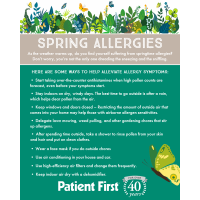SPRING ALLERGY SEASON IS COMING Take steps to reduce the symptoms
SPRING ALLERGY SEASON IS COMING
Take steps to reduce the symptoms
As winter winds down, do you find yourself dreading the approach of allergy season? Don’t worry, you’re not alone.
“Seasonal allergies are very common for this time of year, and it is important to know the symptoms, the steps to reduce allergy symptoms, and when to seek urgent care for allergies,” says Dr. Mark Paster, a Patient First Medical Director.
Here are some helpful tips and information on allergies and how to prevent them.
What are allergies?
Allergic reactions occur when your body comes into contact with an allergen. Your body identifies this substance as harmful, even when it is not. Then, when you come into contact with that allergen again, it reacts to it, causing allergy symptoms. Springtime allergies are most often
due to tree pollen and in areas with more humid climates, outdoor mold. Grass pollen is a big cause of summer allergies, while weed pollen can bring on fall allergies.
What are the symptoms?
Allergy symptoms vary from person to person and depend on the particular allergy. Some common symptoms include itchy, watery eyes; sneezing; runny nose; and congestion. If your seasonal allergies are generally mild, nasal sprays and oral antihistamines can help manage the
symptoms. If over-the-counter treatments do not reduce your symptoms, talk with a physician about a prescription or other treatment.
What steps can be taken to reduce allergy symptoms?
- Start taking over-the-counter antihistamines when high pollen counts are forecast, even before your symptoms start.
- Stay indoors on dry, windy days. The best time to go outside is after a rain, which helps clear pollen from the air.
- Keep windows and doors closed – Restricting the amount of outside air that comes into your home may help those with airborne allergen sensitivities.
- Delegate lawn mowing, weed pulling, and other gardening chores that stir up allergens.
- After spending time outside, take a shower to rinse pollen from your skin and hair and put on clean clothes.
- Wear a face mask if you do outside chores
- Use air conditioning in your house and car.
- se high-efficiency air filters and change them frequently.
- Keep indoor air dry with a dehumidifier.
injuries at our urgent care centers, including allergies.
About Patient First
All Patient First Medical Centers are open 8am-8pm every day of the year, including holidays. Patient First provides non-appointment urgent care for routine injuries and illnesses, as well as primary care for patients who do not have a regular physician. Each Patient First center has on-
site digital x-ray, on-site laboratory, and on-site prescription drugs. Patient First currently operates medical centers in Virginia, Maryland, Pennsylvania, and New Jersey.
-
Victoria Soriano
- April 03, 2024
- (571) 340-1594
- Send Email


